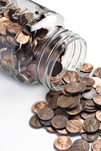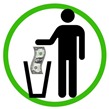Would you rather increase your income, or reduce your spending? Which is better? Read on to find out.
 Pennies, nickels and dimes can add up fast. Have you ever tried putting all your spare change in a jar for a year? One family living in New York City did an experiment of their own, collecting spare change from the streets and plunking it in a 5 gallon water jug. In 3 years they had collected a little more than $1,000! They proved that a penny saved truly is a penny earned.
Pennies, nickels and dimes can add up fast. Have you ever tried putting all your spare change in a jar for a year? One family living in New York City did an experiment of their own, collecting spare change from the streets and plunking it in a 5 gallon water jug. In 3 years they had collected a little more than $1,000! They proved that a penny saved truly is a penny earned.
Just as coins in a jar add up, so do small purchases. It is the little things, not the big ones, that entrench people in debt.
 Small purchases may seem insignificant, but financial experts say Americans waste 16-23% of each month’s paycheck. Out of a $2,500 pay check that’s $400-$575 that vanishes- with nothing of real value left in its place. That is a lot of pennies.
Small purchases may seem insignificant, but financial experts say Americans waste 16-23% of each month’s paycheck. Out of a $2,500 pay check that’s $400-$575 that vanishes- with nothing of real value left in its place. That is a lot of pennies.
If you ask people: “Would you rather have lower expenses or higher income?” Most often they’ll choose higher income. Dollar for dollar this is the wrong choice. Why? Because taxes will reduce the amount of spendable income while reduced expenditures free up money dollar for dollar.
Example: If you earn an extra $1000 and your federal income tax bracket is 25% (you earn between $34k –$82k), then you’ll have to pay $250 of that $1000 to Uncle Sam and around 7% or $70 for your state income tax. Each state has different income tax levels (see state tax chart). This leaves you with only $680 to spend or to save for you and your family. So for every extra dollar you earn, you only get to keep 68 cents. Contrast that with slashing your wasteful spending by $1000 and now you have the full $1000 available for things of real value (don’t forget your savings).
Make financial goals. Make every dollar count. Even if you can only find $20 of savings each month, if you put that money in a savings account or money market account you’ll have $1,200 after 5 years. Not to mention if you can get a high savings rate or money market rate that will add to your money with no extra work.
It doesn’t take heaps of money to get out of debt. You can do it a penny at a time because, like Ben Franklin said, a penny saved is and will always be a penny earned.
